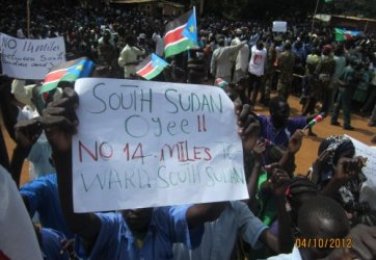Northern Bahr el Ghazal petitions South Sudan president over 14 mile area
October 4, 2012 (JUBA) – Thousands of South Sudanese in the state of Northern Bahr el Ghazal on Thursday turned out to stage a peaceful demonstration and subsequently submitted a petition to President Salva Kiir Mayardit, declaring their total objection to categorization and demilitarization of the 14 Mile area as a buffer zone.

The petitioners argued that they will never relinquish their claim over the area, expressing determination to defend it as it was the case with their ancestors.
“Our grand fathers defended our land with spears and arrows throughout history, and therefore, we, the Aweil community, would also like to clearly state that, we will never ever relinquish an inch of our land to the North based on their unfounded claims, the letter adds.
After a deadlock on the issue of 14 miles, Sudan agreed to include the disputed area in a demilitarised zone Khartoum and Juba accepted as part of security arrangements aiming to prevent future clashes between the two countries.
Initially Khartoum categorically refused the inclusion of 14 miles in the buffer zone and refused to endorse the map proposed by the African Union mediation since November 2011.
Sudanese government refers to a deal struck by the British governors of Darfur and Bahr el-Ghazal provinces giving the giving the ownership of the grazing land to Darfur to reward the pastoralists Rezeigat for their role in the annexation of Darfur to Sudan in 1917.
The area is disputed by Rezeigat and Malwal Dinka since the 18th century.
Mayuol Diing, Secretary General of South Sudan’s governing Sudan People’s Liberation Movement (SPLM) youth wing office in the state, said in an interview with Sudan Tribune that the youth would never accept any claim which Sudan lays over the area.
“This is where I come. I was born and raised in this area. It has never been part of Darfur. So our message to our central government and the mediators is that the area is part and parcel of Northern Bahr el Ghazal and will it will remain part of it even if a decision is taken to withdraw the national army from the area,” Diing told Sudan Tribune from Aweil town, capital of the state.
The youth leader explained that their borders with Darfur are known and that their relations with neigbours including Rezeigat and Misseriya should never be politicized to create stability and social harmony between the two communities.
“We know where our boundary lines meet. Our borderline meets in Lol Apat, Rum mamer, Yiith Anoon, Magak Anok, Majok Diing, Bulich, Kur chum, Mamer Korok, Mabior Ngor Tong, Pan Their Akol Mariel, Maker Lual Dau, Loki, Yak Lual, Manger Deng Yel, Mabior Yathdit, Awou just to name but few. All these areas are on the other side of Kiir River,” he explained.
Daniel Akol Diing, chief whip at the state Legislative Assembly stated also that negotiators on behalf of the government of South Sudan at the talks had little knowledge about the area.
“Actually the area has never been part of Darfur. Our border with Darfur is more than 36 miles northward of Kiir River. So our negotiators are innocent. They do not know our borders with Rezigat,” Diing tool Sudan Tribune asking that representatives from the area be included in the next round of talks.
According to a deal reached in Addis Ababa, Southern Sudanese forces will be withdrawan from the area, and a tribal mechanism will be tasked with the management of administrative affairs.
Kuot Jel Akoon, a former state minister of physical infrastructure also protested the deal and explained south of Kiir River extends to Gokmachar, an administrative headquarters of Aweil North County.
“If by any chance the agreement is effected and the police is withdrawn from that County, I want all of us to imagine how will that County function? How will the population of Makem, Duluit Bol, Korok, Duluit Tem, up to Lou Aguer living within 14 miles be protected,” Akoon asked in a statement on Thursday.
He further explained that area has never been made as a “no man land” and that Rezeigat and Misseriya were only given access to pastures because all the communities in the formerly united Sudan could not be denied pastures.
He gave example of a case in which cattle owners in the state moves with their cows in search and water and pastures in neigbouring states.
“When some communities in Abiem and Paliet in Aweil and South take their herds to Apuk in Warrap state wet land for grazing during drought period, does it make Northern Bhar el Ghazal people a right over Toic (swampy area in Apuk,” he asked
Deng Thiep Akok, former commissioner of Aweil North and native of the area said he would never buy any claim over the area and that that was why it has never been part of any discussion even during the comprehensive peace agreement.
“I actually do not understand how the area came to be part of current discussions in Ethiopia because there has never a complaint about it. Rezigat knows it very well that the area belongs to north Bahr el Ghazal. This is why they always send a message seeking approval of the local chiefs to come with their cattle whenever it is a dry season,” explained Akok
(ST)
